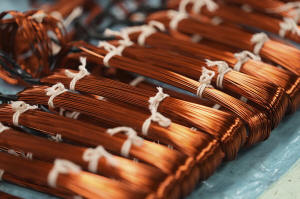Mexico celebrates dodging latest US tariffs but feels the effects of
global economic uncertainty
[April 04, 2025] By
MARÍA VERZA and FABIOLA SÁNCHEZ
MEXICO CITY (AP) — Mexico celebrated Thursday having dodged the latest
round of tariffs from the White House taking aim at dozens of U.S.
trading partners around the world, but was also quickly reminded that in
a global economy the effects of uncertainty can’t be entirely avoided.
President Claudia Sheinbaum said the free-trade agreement signed by
Mexico, Canada and the U.S. during Trump’s first administration had
shielded Mexico.
Now her government will focus on the existing 25% U.S. tariffs on
imported autos, steel and aluminum, while accelerating domestic
production to safeguard jobs and reduce imports.
“During my last call with President Trump, I said that, in the case of
reciprocal tariffs, my understanding was that there wouldn’t be tariffs
(on Mexico), because Mexico doesn’t place tariffs on the United States,"
Sheinbaum said.
Economy Secretary Marcelo Ebrard noted that despite having free-trade
agreements with the U.S., many countries were targeted by the tariffs
U.S. President Donald Trump announced Wednesday on what he dubbed
“Liberation Day.” Trump framed the tariffs as a way to bring
manufacturing jobs back to the U.S.
Noting that Mexico escaped the latest round of tariffs, Ebrard said
swaths of Mexican exports including agricultural products like avocados,
clothing and electronics will continue to enter the U.S. without import
duties.

Ebrard said it wasn't a given that the free-trade agreement would be
preserved, “because in a new commercial order based on tariffs it's very
hard for a free-trade agreement to survive.” The fact that it did, puts
Mexico at a competitive advantage, because “it's going to be cheaper to
produce in Mexico than in any other part of the world.”
Oscar Ocampo, a specialist in foreign trade at the Mexican Institute for
Competitiveness, a think tank, said “the United States is closing off to
the rest of the world and in relative terms closing off less with Mexico
and that is an opportunity.”
Sheinbaum is seeking to use that opportunity to encourage companies
producing in Mexico who had not been exporting under the free-trade
agreement for various reasons to take the necessary steps to qualify.
She cited major German auto producers as an example.

[to top of second column] |

Bundles of copper cables sit at a plant that produces parts for
large electric vehicles in Mexico City, Wednesday, April 2, 2025.
(AP Photo/Fernando Llano)
 Qualifying for the free-trade
agreement could involve anything from doing paperwork to making
adjustments to the sourcing of a product.
Despite Trump's latest tariffs not being imposed on Mexico, the
uncertainty they created and the interconnectedness of the North
American auto supply chains meant it didn’t take long for the
effects to touch Mexico.
Stellantis, maker of auto brands including Dodge and Jeep, announced
that it would pause production at its assembly plant in Toluca west
of Mexico City for the month of April while it assesses the tariffs'
impact on its operations. The company has more than 15,000 employees
in Mexico. A similar temporary production halt was scheduled for an
assembly plant in Canada and some 900 workers were to be temporarily
laid off across several plants in the United States.
That uncertainty is part of the reasons why Sheinbaum is pushing
Plan Mexico, an initiative to promote and cultivate more domestic
production.
As an example, she cited a collaboration between her government,
local universities and Mexican companies Megaflux and Dina to
produce electric buses for public transportation.
Ebrard said recently that the buses represent not only a
technological advance in Mexico, but also a “strategic decision” in
favor of Mexico’s industrial sovereignty.
At a factory in Mexico City, the electric buses called Taruk —
trail-runner in the Indigenous Yaqui language – are already in
production. Megaflux Director General Roberto Gottfried said the
company hopes to deliver some 200 by year's end.
He noted that some 70% of the Taruk's components are produced in
Mexico, including its motor, but the lithium batteries that power
them come from China.
In a country where one out of every three people use public
transportation every day, developing this sector domestically is
critical, Gottfried said.
Despite the global economic challenges presented by the uncertainty
caused by tariffs, he said, Mexico’s large internal market gives the
initiative a competitive advantage to develop and weather the storm.
All contents © copyright 2025 Associated Press. All rights reserved |